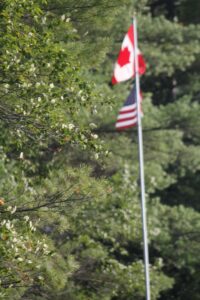A (HOPEFULLY) HELPFUL HINT
When you’re typecast as terminally polite and stuck next to a family determined to revel in being the stereotypical “neighbours from Hell,” the courteous thing to do is offer them a copy of Robert Burns’ poem, “To a Louse”.
Written in the 18th century, it uses the image of a louse climbing on a fine lady sitting in church, to explore themes of self-awareness, social justice and the importance of all life.
It’s most famous line is: “O wad some Power the giftie gie us, to see oursels as ithers see us!” (In modern English, “Oh would some Power the gift give us, to see ourselves as others see us.”)
I realise few members of the MAGA family are likely to appreciate either version, but it neatly sums up what they need, and one can but try.
Also, it might help those Americans who fear that the “Again” part of the MAGA acronym might turn out to be “Never Again”, that there remains a modicum of sympathy for their plight.
Trump’s tariffs are a source of deep resentment and anger in Canada, but that doesn’t mean Americans are no longer welcome here.
In the month and a half I’ve been back at our cottage, the most antagonistic gesture I’ve seen was “FUCK TRUMP” painted across the back of the cab of a pickup truck.

My lakeside neighbours have no problem flying the Stars and Stripes, as they have always done, respecting the convention that the host country’s flag is always on the top of the pole.
A CBC morning radio show recently asked a random sample of people on the street in Toronto what they thought of Trump. In a reinforcement of the stereotype of Canadian politeness, a grandmotherly-sounding lady replied: “I really don’t want to say anything nasty, But you know, I don’t think that man could have graduated from kindergarten.”
Sitting in a coffee shop, I overheard two men my age discussing Trump’s America.
“He cut food aid for people who need it.” one said. “What are they supposed to do? Steal to eat?”
“And the gun laws,” his companion replied. “Who the hell are they afraid of, anyway?”
The answer seems to be, everybody and everything.
After right-wing dingbat Laura Loomer posted on social media that visitor visas for people from Gaza, including children in need of urgent medical treatment, was a “national security threat”, the visa programme was cancelled.
Pause for a moment to ponder that.
In spite of its preponderance of military might, nuclear capability and (for now but how much longer) financial dominance, sick, wounded and maimed children from a war zone thousands of miles away represent some kind of clear and present danger to the United States.
So too, allegedly, do Canada and Greenland not being part of the United States, Brazil putting its former president on trial for plotting to overthrow an election he lost, and foreign students at Harvard, to name but a few.
On the same basis, the Trump administration banned citizens from 12 countries, most of them Moslem, from entering the U.S.
Immigrants seeking a better life (which, coincidentally, is how both the U.S. and Canada came to be what they are today) apparently pose a threat so grave it has to be met with armed, masked, unidentified men forcibly detaining anyone they choose to view as a “national security threat”, generally based on perceived ethnicity.
Even a cursory look at all of that carries the lesson that the real danger is the hatred it will foster in future generations, whose view of the U.S. will be that it spurned them when they were most in need, and did not understand, or care, that greatness only exists if it is shared.
THE CYNICAL VIEW
Why is everyone supposed to pay attention to and worry, which is another way of saying be fearful, of what Trump says or might do?
Especially when he doesn’t seem to have any ideas that last longer than the space between whatever he hears.
Excessive flattery is now standard practice for foreign leaders and dignitaries: “All in all, the Ukrainian president thanked Trump about 11 times…joining the other European and NATO leaders in a chorus of gratitude singing Trump’s praises.”
Naturally, Trump saw that through the prism of his ego, and claimed: “A year ago, they wouldn’t have come. They wouldn’t have even thought about it.”
That’s because they’d have understood without asking that the president of the United States would represent their common values.
What they understand now is that they have to look after their own interests, together.
The full title of Burns’ poem is: ‘To a Louse, On Seeing one on a Lady’s Bonnet at Church’.
Like the lady who thought she was a regal being, the nation that styles itself “America” cannot, but would do well, to see itself as others see it.
Comments are welcomed. Click CONTACT on the site header.
To receive e‑mail alerts to new posts, Click SIGN-UP on the header.